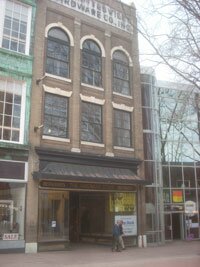ESSAY- Chain reaction: What's wrong (and right) about these stores

Urban Outfitters is slated to open May 21, according to a company spokesperson.
PHOTO BY HAWES SPENCER
Walking along the Downtown Mall– to and from work during the week or with my dog during the weekend– is one of my favorite parts of the day. Recently, during those walks, I have been struggling with my feelings about a looming change in the Mall's landscape.
As recently confirmed by company statements and the appearance of a banner announcing the store's imminent arrival, Urban Outfitters is opening a store in the space formerly occupied by The Hardware Store restaurant. Urban Outfitters is a retail clothing chain based in Philadelphia with 140 outlets across the country and annual revenue of approximately $1.5 billion.
Except for CVS (and, depending on one's definition of "chain," regionally-based Five Guys burgers and high-end paper story Caspari), there are currently no chain stores or restaurants on the Mall, and there have only been a handful there since Main Street was bricked-over in 1976.
My sense is that the new Urban Outfitters may be a harbinger of a changing-of-the-guard in the Mall's merchant landscape and a precursor to the arrival of additional chains. Think Starbucks, Banana Republic, Borders, and Crate and Barrel.
To sort out my conflicting feelings about chain stores, I developed the following checklist to evaluate the pluses and minuses of chains on the Mall:
The impact on employees and consumers
Opponents argue that the employees of stores like Urban Outfitters and Starbucks make less, on average, than the employees of local retailers in the same line of business. According to some studies, within several years after chain stores arrive in a community, wages and benefits of workers in non-chain businesses decline, as local businesses are compelled to cut back on employee expenses to remain competitive. Chain store supporters argue that the evidence on wages and benefits is inconclusive and that, in any event, chains' lower wages are outweighed by the immense benefits that they offer to consumers– in particular, the chains' ability to offer high-quality goods at reasonable prices. Put differently, chain stores became chain stores precisely because they developed business models that satisfy consumer demand in a way that local businesses do not.
My verdict: PRO-CHAIN.
The impact on locally-owned businesses
A frequent criticism is that chain stores undercut local competition and dry up home-grown business. In particular, chains' ability to offer (1) a wider range of products and (2) lower prices (because they can buy stock in bulk) mean that consumers will frequently abandon local businesses over price and convenience. Barnes and Noble and Borders, for instance, can offer both a wider range of books and lower prices than many independent bookstores. However, a number of studies demonstrate that the arrival of a chain store in a community, or in a particular shopping area like the Downtown Mall, actually benefits the surrounding businesses by increasing the overall amount of customer traffic. Even local stores in direct competition can benefit from the opening of a nearby chain; for instance, some independent clothing boutiques have reported, after the fact, that the opening of a Gap or Banana Republic has positively impacted their sales.
My verdict: TIE (and I defer to the retail business owners on the Mall).
The impact on the community-at-large
Opponents of chain stores argue that the profits they generate do not remain in the local community, since their headquarters are located elsewhere and, in the case of publicly-owned chains, because their profits are distributed to shareholders. According to one study, only 14 cents per dollar spent at chain stores remain in the local economy, whereas local retailers spend more than half their revenue locally. Locally-owned stores rely on other local businesses (contractors, architects, banks, accountants, media, etc.), whereas chains tend to use national firms or outside providers of these services. Supporters of chain stores counter this argument by pointing out that local governments benefit directly from chains in the form of increased sales tax and property tax revenue.
My verdict: ANTI-CHAIN.
The impact on the "look" of a community
Some architecture critics and planning experts have complained about the aesthetics of chain stores. Whereas local businesses might have quirky, unusual, and distinctive storefronts, each Banana Republic looks the same as the next, and the result is that communities dominated by chains become visually homogenous and– depending on one's taste– boring or even ugly. The flip side of this argument is that successful chains have developed appealing styles. Starbucks, for instance, has been praised for having created, in layout and décor, an ambience that appeals to a range of customers.
My verdict: ANTI-CHAIN.
Based on my checklist, then, I am against chain stores on the Mall by a tally of 2 to 1, with 1 tie. All things being equal, I hope that Urban Outfitters is not a precursor of additional chain stores. I enjoy, too much, the feeling when I walk along the Mall that this space is unique and that its uniqueness stems, in part, from local ownership of so many of shops and restaurants.
Where do you stand?
~
Walker Richmond is an attorney at Richmond & Fishburne. One of his favorite childhood memories is Saturday trips to the Downtown Mall for lunch at Timberlake's with his family.
#